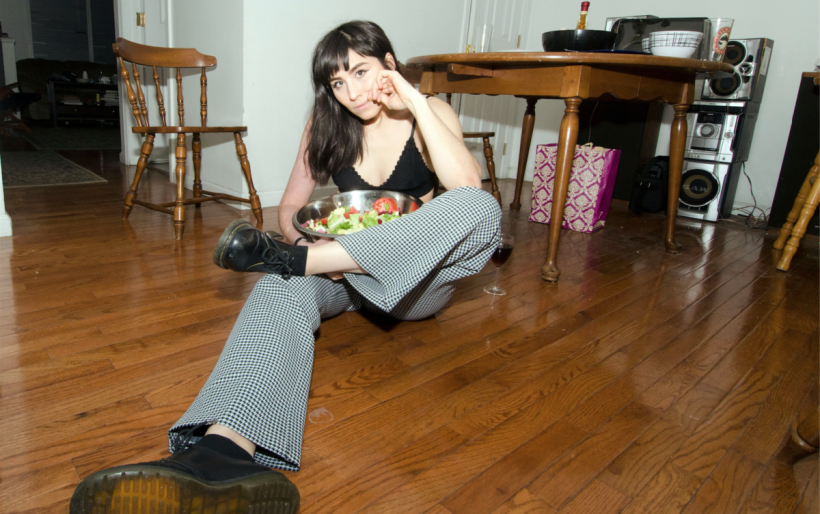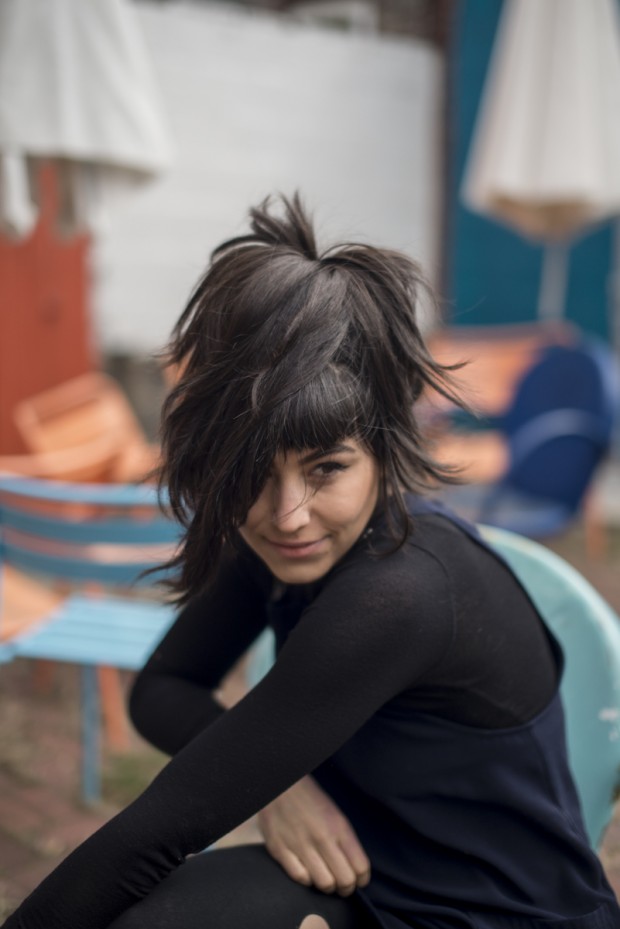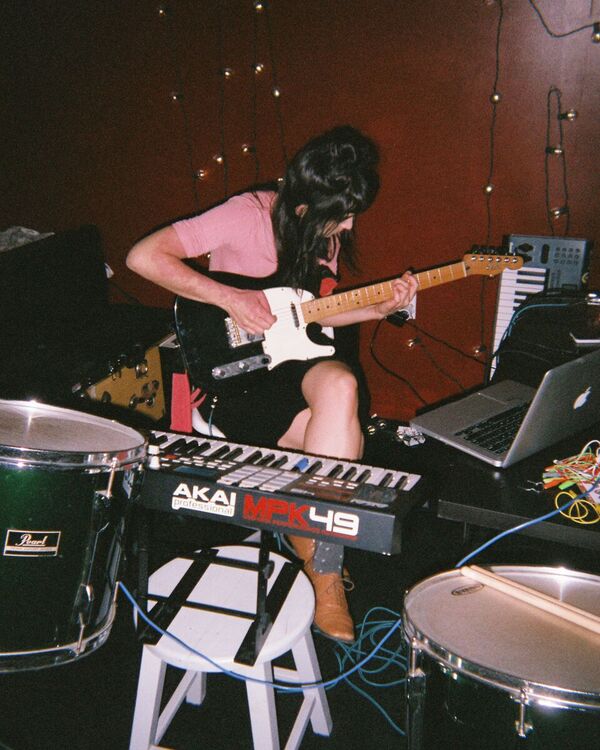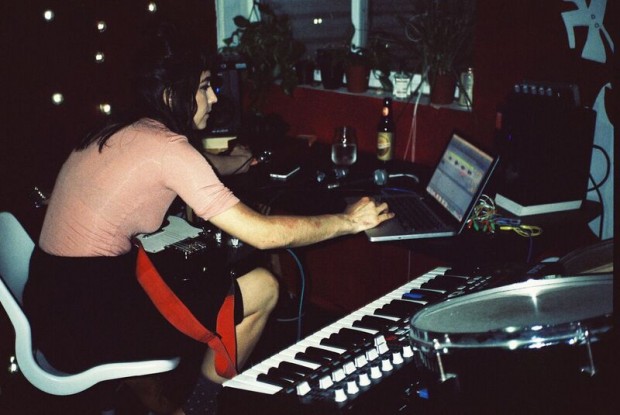
Aphra | photo by Megan Matuzak | courtesy of the artist
Give Me TV, Give Me Something: The melancholic intensity of Aphra’s Rebecca Way
It’s 10 p.m. and Rebecca Way is crouched in fetal position in the middle of a frigid, musky Philadelphia warehouse. The spacious room is filled with an eclectic assortment of objects befitting a garage sale – an antique dinner table, a dusty sofa, a potted cactus, a stack of books, an old Epson scanner. The building releases a deep rumble every few minutes as the nearby Market-Frankford El passes by. Suddenly, Way, clad in an all-black outfit that matches the color of her hair, pops up and begins to nimbly roll her way around the cold concrete floor. She’s in the middle of rehearsing her music video for “Geranimo,” the first single from Sadness Is a Gesture – the debut EP from her one-woman project Aphra, set to be released this spring.
Way barks commands to her backup dancers, a group of three hip twenty-somethings: “Pump! Pump! Frankenstein! Frankenstein! Body roll!” But in between run-throughs she also casually ruminates on twerking with one of the dancers, asking, “Don’t you have to be able to like, vibrate?” They share a laugh, and the rehearsal continues.

Aphra | photo by Natalie Pisterchio | photo courtesy of the artist
On a dreary Wednesday afternoon three days earlier, the 26-year-old Way sits at the Gryphon café, an artsy hideout nestled away on a nondescript street corner in South Kensington. “I’m fucking blasted on caffeine right now,” she interjects. She works at local coffee shop called ReAnimator as a day job and is taking full advantage of the rare opportunity to drink someone else’s coffee. As she goes back to refill her cup, she stops to ask the barista what kind of beans they’re brewing.
Much of Way’s music can be understood as an amalgam of influences. She hails from a musical family – her father is a songwriter, her mother a DJ – and her education as a teenager only further paved her artistic path. After a year at a Catholic high school, she transferred to the Girard Academic Music Program (GAMP) in Philly, though she jokes that it was mostly because she didn’t make the cheerleading team at her old school. “I was a mess,” Way recalls. “I wish I could say I went to the school because I wanted to do music, but I really was just wrecked from cheerleading.”
Way chose the pseudonym Aphra as an homage to the influential but largely unknown 17th century feminist writer Aphra Behn, whom she studied during her time at Temple University. On Sadness Is a Gesture, she crafts soulful, R&B-infused pop on top of a crisp layer of electronic production. She cites a range of compelling songwriters as major influencs, including Cat Power, Fiona Apple, and Youth Lagoon.
Way has a particular affinity for the way Youth Lagoon merges the emotional kick of singer-songwriter lyrics with a significant electronic influence. “Electronic music has a bad rap in some circles, because it’s ‘not real music,’” she says, adding sarcastic air quotes, “but Youth Lagoon can write a really beautiful, interesting song that has integrity.”
It’s easy to hear parallels between Aphra and Year of Hibernation era Youth Lagoon. There’s a clear electronic tinge to the tracks, but it’s understated, affording them a greater sense of intimacy. On “Geranimo,” an eerie xylophone melody begins the track alongside an electronic hum, creating a futuristic-sounding backdrop that perfectly sets the stage for Way’s alluring vocals, which sound like they’re being whispered straight into your ear.
Way’s vocal prowess comes as no surprise when you consider her high school days at GAMP. Every student sang in the school-wide choir, she remembers, as well as in smaller ensembles. The experience taught Way how to control her voice like a perfectly tuned machine.
Megan Matuzak, Way’s manager and a fellow Temple grad, says she was immediately struck by Way’s “unexpectedly unique and spectacular” vocals the first time she saw her perform. “The control over her voice and vibrato – personally it reminds me of Janis Joplin,” Matuzak says. “It’s basically like yodeling.”
Alex Santilli, who helped Way master “Geranimo” and founded the recording studio Spice House Sound, also cites Way’s voice as one of her greatest attributes. “It just has this beautiful, haunting raspiness to it,” he says, “which fits perfectly with her dark ambient style.”
But that grittiness can also make Way’s music especially difficult to master – there’s always the risk that you clean the track up too much, Santilli says, which can take away from the raw emotion of the vocals. “With ‘Geranimo’ I tried to do as little as possible to it,” he explains. “I like to polish what’s already there, not recreate it.”
If you talk to Way for long enough, the themes of feminism and modernity are bound to come up. In this sense, “Geranimo” is a perfect representation of her work – it’s a song that encourages women to get in touch with what they’re really feeling in the face of the obstacles of 21st century life. On the track she sings, “Give me TV, give me mirror, give me window, give me something / Cause I’m looking to save my skin not my soul,” capturing a manic search to find anything to distract actual feelings.
“Modernity makes us all separate from ourselves, we’re all moving so fast,” Way explains. “Luckily I’m a musician, because if weren’t I feel like I’d be completely out of touch with myself.”
In getting in touch with her emotions, Way has made a record that doesn’t shun sadness, but rather embraces it. “This EP…I mean it’s called Sadness Is a Gesture. It’s about me being really sad,” she says, laughing. But by touching such personal and emotional subjects, Way has found a therapeutic way to come to terms with what she’s feeling. “Nobody wants to feel sad,” she says, “but making this record has let me touch it and really feel that way without being completely overwhelmed by it.”
Although Way is comfortable with her music today, this wasn’t always the case. “I struggled for so many years, mostly to please my dad, in terms of my music,” she explains. “When I first started in Philly I was known as a blues and Americana singer, so I would get up there with my acoustic guitar and sing my little Taylor Swift songs.” While this made her dad extremely proud – for a time she even covered some of his old songs, but “then there came a point where I was like ‘I don’t want to do this anymore, I don’t identify with this.'” – it wasn’t the music she wanted to make. One day she decided enough was enough. “I’m not gonna go sing about green pastures and stuff, shit where it’s not going on,” she says with tenacity.
Tutlie, a female-led baroque pop group who excel in creating sunny, carefree melodies, provided the perfect opportunity for Way to step outside of her musical comfort zone. She stumbled her way into the group almost by accident in 2014 when she served coffee to band’s producer at ReAnimator. He suggested she check out Tutlie, and after seeing a few of their shows and chatting up the band, Way was soon offered a spot on vocals and guitar.
Way had never been in a band before, and she notes that there was a bit of a learning curve, especially coming from a solo background where she had complete creative freedom over every aspect of her music. “I had to face a lot of control issues,” she says with a laugh. “But I learned a shit ton and they were amazing in helping me grow as a person and a musician.”
Even during her two-year stint with Tutlie, Way was still experimenting with making her own solo music. One of these projects was recorded with Santilli. Though he likes what they made together, he notes that the music was much more upbeat and drum-heavy than the tracks on Sadness Is a Gesture. “Her solo stuff is much more atmospheric, and I think she’s become a lot more true to herself,” he says.
For someone as fiercely independent as Way, it’s no surprise that these side projects with her friends never really panned out. She was just starting to dabble with electronics, so she was “completely reliant on other people.” Eventually she made the decision to seriously pursue a solo career. “It got to the point that I wanted to give Aphra all the attention it needed,” Way says. “Long story short, I was like ‘Fuck it, I need to do it myself.’”
Tutlie’s Spring 2015 tour was ultimately the catalyst that provided Way with the creative inspiration she needed to fully devote herself to Aphra. Over the course of about a month, she weaved her way across the country, beginning in Columbus, Ohio, then snaking down to Austin for a few shows at the renowned South by Southwest Festival, before finally working her way back up the East Coast to Washington D.C.
There was something about that tour – the long stints in a 16-passenger van, the beautifully nondescript landscapes across what Way jokingly describes as “farm and Jesus land” – that kicked her brain into full creative gear. Some days were so long that she would forget what state she was in – sometimes she would go into gas stations and ask, “Where are we right now? Arkansas? Tennessee?”
During those long rides, her bandmates would often put on their music, which Way would absorb like a sponge. “I would hear aspects of their personality that I never knew before through their music,” she says. “Imagine sitting in a van for huge stretches with nobody really talking, subconsciously taking in all this music that I would have never made time to listen to at home because I’m so preoccupied and distracted. Those three weeks were like a vacation to me.”
When she returned to Philly, Way left Tutlie and dove headfirst into Aphra. Unlike her other solo-project experiments, this time she was completely in charge. “I feel like female artists in particular get caught into this ‘I’m a singer and I need producer to produce me,’ mindset,” she says. “I tried that rout several times, but it never worked out.”
This burning independence is what Matuzak highlights as Way’s single greatest strength. “It would probably drive Rebecca insane if she recorded Sadness Is a Gesture completely alone, with no help at all – but she could still do it,” she says. “She’s very level-headed and willing to put in the time to make it work.”
But while Way is incredibly autonomous, she’s not afraid to admit she’s received plenty of help along the way. Living in Fishtown, one of Philly’s burgeoning artist hubs, she is practically surrounded by musicians everywhere she goes. From her coffee shop, which is staffed almsost entirely by artists, to her apartment (her neighbor Eric treats her vocals and she never hesitates to knock on his door in the middle of the night asking for help), Way describes her music career as a “family effort.” Even so, she’s unable to hide her own sense of pride, quickly adding with fiery passion, “But I’m not going to cut myself short, either. I worked real fucking hard.”
Way’s home is nestled away in a nice alleyway that feels quaint, despite being just off the freeway. When she answers the door on a Wednesday night after a full day of work, she’s already in her pajamas, her normally stylish bangs replaced by a whimsical side ponytail. Way recorded Sadness Is a Gesture right in her own bedroom, a cozy basement hideout with blood red walls and tiny light bulbs hanging throughout like Christmas lights. As she talks, she munches on some pasta she’s just finished cooking – she’s been so busy with recording the past few weeks, it’s all she’s had time to eat of late.
Her home studio is shockingly minimal, especially when you consider how fully produced her music sounds – there’s a keyboard in the corner, a drum set she says she doesn’t really use, two speakers perched on top of a pair of high stools, and a few microphones laying on a wooden chest. Even though Way records in her own bedroom, she’s hesitant to describe her music as bedroom-pop. “Bedroom pop is cool,” she says, “but it has a connotation. You think it’s going to sound fuzzy. I prefer that sparkly, clean, James Blake-y kind of approach.”

Aphra’s Rebecca Way surrounded by gear in her home studio | Photo by Mina Lee | courtesy of the artist
She notes that despite the convenience of recording in the same space where she sleeps, the arrangement can also present some difficulties. “Sometimes I lay in bed for two and a half hours, just staring,” she says. “When the recording studio’s right there, it’s hard to separate the boundaries – sometimes I’ll work until 4 or 5 a.m. and get nothing done.”
It’s especially difficult for Way to be productive at times because she’s such a self-critic. “I’m constantly beating myself up,” she says. “The recordings are solely me, top to bottom, and I’m putting everything into them – my fingers, my eyeballs, and my brain, too. It’s scary being that vulnerable,” she says, her voice cracking slightly. “It can be a pretty isolating experience.”
Way takes the production side of her work extremely seriously – building beats, creating textured layers of synthesizer – but she nevertheless considers songwriting to be the most important aspect of her music. She always writes her songs first, only later adding the vocals and production. “I fill about one of these a month,” she says, reaching for a big black journal sitting on the table next to her. “I’ll pick it up and be like, ‘Fuck, what am I feeling?’” and then answering her own question, “‘I don’t know what I’m feeling because I’m so out of touch with myself!’”
From there, Way picks out phrases that she’s written and pieces them together to make songs. “I hope that when people listen to this record they say, ‘The production is pretty, but the songs are what’s best,’” she says. “The songwriting at the end of the day, the lyrics, is what I want people to listen to. Whatever bows it’s wrapped in are not as important.”
Although most of the tracks on Sadness Is a Gesture are somber, Way does not want to make an EP that is one-dimensional. She’s currently working on a track she describes as a “shameless girly pop song” that she hopes will be a change of pace from the rest of the album’s material. She also has another song on the record called “Happy,” which, despite its name, is not happy. Musically, it represents a stark shift away from the vocal-electro fusion that makes up the majority of the EP.
Indeed, on “Happy,” Way sounds like a completely different artist. She’s ditched the computer, instead opting to use only electric guitar (which is conspicuously absent on her other songs). The result is a song that is delightfully grainy, unlike the crystal-clear pop of the rest of the record. Way’s lonely whistles float across the background of the track like a tumbleweed before a wild west shootout, while her breathy vocals quickly transform into a painful wail similar to lo-fi rocker Angel Olsen.
“Happy” was always intended to be unlike the rest of the album, but not to such an extent. Way explains that it’s a song about someone who inspired her to “not take shit so seriously and just write a good fucking song.” That’s the rock-and-roll ethos you can hear so plainly throughout. But Way, always the perfectionist, still wanted to clean up the song a little bit. “I tried to find the original session to make it better, but I couldn’t find it – it was gone,” she says. She still liked the song, though, so she said to herself, “Well, I guess this is it then,” and kept it exactly how it was.

Aphra | Photo by Mina Lee | courtesy of the artist
Today, Way is nearly finished with the EP, and it’s safe to say she’s feeling a bit relieved. Above all, she’s looking forward to finally having a complete product. She hopes that people can relate to the record, noting that “the goal of all art is to speak to people,” but that she’s also not going to beat herself up if you don’t. “Whatever the fuck you want to call it, I’m just so over it and want you to like it or not like it,” she says.
Having a finished record is also a source of excitement for Way because it means she’s finally able to start playing shows again. Performance is therapeutic for her, and she says that she doesn’t feel like an artist when she isn’t on stage and sharing her work with an audience. She just returned from a California tour in early March, her first since that fateful three-week trek across the country with Tutlie that helped bring about Sadness Is a Gesture in the first place. Way also has two Philly shows on the docket, on March 24th at The Kelly Writers House on the University of Pennsylvania campus (more information on that can be found here) and on April 2nd at Bourbon and Branch (more information on that at the XPN Concert Calendar).
While one might expect someone as creative and driven as Way to feel rushed to start something new following the completion of her album, she doesn’t feel any such pressure. In fact, she expresses disdain at a society that pushes us to move so quickly from one project to the next.
“Do you know how long it takes to understand art and understand what you’re supposed to be doing?” Way asks. “I’m trying to do what the fuck I want. We already have enough pressure to conform just as females in general, and then I’m going to be an artist on top of it?”
Perhaps most importantly, Way finally feels comfortable in her own skin, both as a person and as an artist. “All of my negative things about me, I’m just starting to get the point where I’m not beating myself up about it. If you don’t like it, sorry.”
And then, addressing an imaginary set of critics, she continues, “One of us has to go, and it’s not going to be me.”